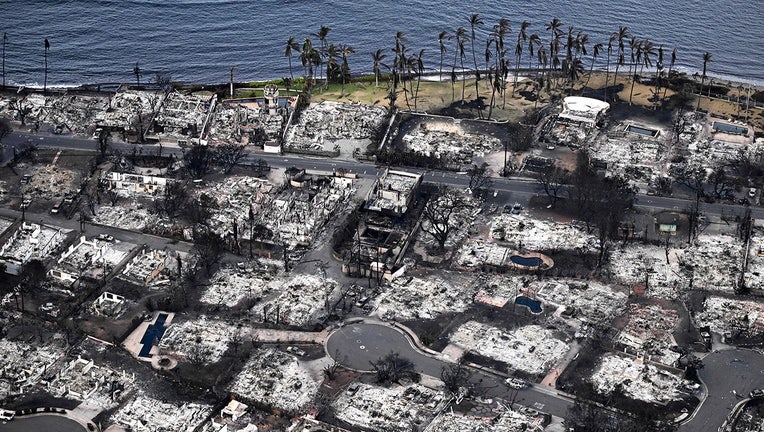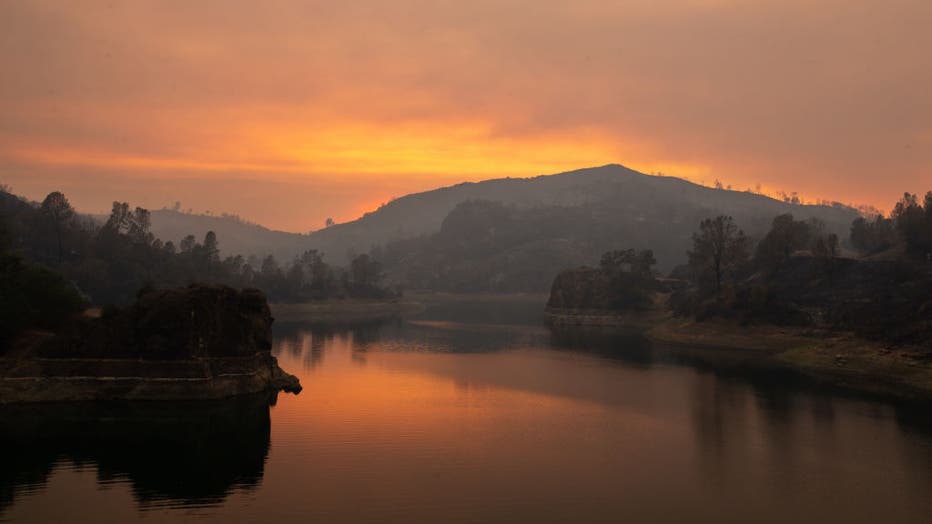Worried by summer's disasters and extreme weather? Climate scientists have advice

An aerial image taken on August 10, 2023 shows destroyed homes and buildings burned to the ground in Lahaina in the aftermath of wildfires in western Maui, Hawaii. (Photo by PATRICK T. FALLON/AFP via Getty Images)
OAKLAND, Calif. - If it feels like life as we know it is unraveling, that's probably because recent headlines have been quite alarming. This summer alone, there's been 100-degree water off the Florida coast, hurricane-fueled wildfires that devastate Maui, Canadian wildfires that produced poor air quality across the Northeast and Midwest, and now California's first tropical storm in 84 years. Plus, there was the conveyer belt of atmospheric rivers that walloped the Bay Area this past winter.
The climate crisis is disruptive, and experts agree, there's everything to gain by taking action now.
"We really are at that point. The whole web of life is unraveling. More important than quarterly profits declining [from corporations] is if we combat climate change," says Professor Stephanie Siehr, the program director of the University of San Francisco's Master of Science in Environmental Management.
So how exactly can people make a difference? We reached out to scholars in the environmental field for some advice.
Siehr's colleague, Professor John Callaway boiled it down in simplist terms:
- Eat less meat (National Resources Defense Council says to actually eat the food you buy and compost what you can't)
- Drive your car less (Try taking public transit or drive a fuel-efficient vehicle or even carpool. Also, maintain your ride; properly inflated tires can save Americans 1.2 billion gallons of gas each year. Tune-ups can also boost miles per gallon and a new air filter can get you a 10% boost. Remove unnecessary accessories from your car roof. Roof racks and clamshell storage containers can reduce fuel efficiency by as much as 5% - information from nrdc.org)
- Insulate and reduce energy use at your house (heat pump, solar, etc.)
- Fly less (flights are energy intensive and depend on fossil fuels. "Emissions from flights stay in the atmosphere and will warm it for several centuries." Information from David Suzuki Foundation)

NAPA, CA - AUGUST 20: Smoke from the LNU Lightning Complex fire is reflected on Lake Berryessa after sunset as the smoke moves over Napa County, Calif., on Thursday, Aug., 20, 2020. (Photo by Ray Chavez/MediaNews Group/East Bay Times via Getty Images (Getty Images)
Siehr gives the moldy cheese example to make a point about wasted food. "You get cheese and it goes bad. You create methane from the moldy cheese degrading." But you also have to think about all the steps it took for your cheese to sit in the fridge just to get moldy. "The fertilizer that went to the corn used to feed the cows that make the cheese, the gas used in shipping. All of those greenhouse gas emissions from the steps."
"Be connected to the process," Siehr says about how food is raised and the process of mass consumerism. "Understand it and have gratitude." She says more than half of humanity are urban dwellers, who are disconnected from agricultural production. She uses her own Midwest origins as an example. "We raised some of our food in rural Wisconsin. There was no garbage truck. We used wood from the forest to heat the home. When you have that connection, you appreciate, and you don't waste."
But it isn't practical to think everyone can return to the land.
University of California Berkeley's Professor David Romps, with the Department of Earth and Planetary Science, had another take. He couldn't emphasize it enough: "Electrify everything."
"Electrify everything means electrifying cars ([Electric Vehicles], not internal combustion engines), electrifying the kitchen (induction range, electric oven), electrifying heating and cooling (heat pump for forced-air heating and cooling), and electrifying hot-water heating (heat pump water heater) so that we can stop purchasing and burning the fossil fuel that is causing global warming."
He goes further, explaining that people can advocate for policies that would rapidly decarbonize the grid; in effect, eliminating coal and gas from the power mix.
"There are other contributions that can be made, but they should not be confused as substitutes for those two," Romps says.
To reduce energy use, Romps says look into home insulation improvements and solar photovoltaic technology.
He says focusing on plastic and water reduction is ineffective and distracts from what really needs to be done. "Plastic waste, AirPods, recycling, and water use have almost nothing to do with mitigating further global warming."
Siehr touches on something called "planned obsolescence" in how certain modern technology is manufactured; smartphones made of minerals and metals mined around the world. "They're planned to become junk so quickly so they [tech companies] can sell you more. Not long ago in the U.S. there was pride in making something durable that would hold up."
Stream KTVU on your TV by downloading Fox Local on your Roku, Amazon Fire, AndroidTV or AppleTV device for free. More details here.
Bruce Riordan with Berkeley Climate Change Network says individual actions are helpful, but not sufficient to make necessary statewide reductions in greenhouse gas emissions and to halt rising temperatures.
"We need policies, funding, incentives, regulations and other statewide measures if we are to succeed," says Riordan. "We are seeing significant impacts—wildfires, heatwaves, drought, extreme storms—already with just over 1.2˚C and that warming will hit 1.5˚C by 2030 and higher in the next decade or two. Personal choices are good, but we must build an energy system in which people can make global-friendly choices that are affordable and meaningful."

The Oakland Coliseum under an orange sky because of wildfire smoke. Sept. 9, 2020
Riordan notes that the largest source of greenhouse gasses (GHGs) in California, and the hardest to deal with, is transportation.
He says individual actions that cut automobile, truck and airplane travel are helpful — "buying an EV, reducing one’s air travel, using public transit instead of driving, walking/biking instead of driving etc." Transportation is responsible for 14% of global greenhouse gas emissions, according to Project Drawdown.
But Siehr says while electrification is important, it's not enough. "Support public transit. If we're just swapping out oil-powered cars for electric cars, we're still paving roads, making batteries, using metal, asphalt and moving it around the world."
Siehr reminds us our action in preserving the planet should also be political.
"Vote for public servants who will work on climate and take it seriously; pass laws, work on infrastructure. That's a big way in which someone can help," Siehr says.
If it all feels futile at this point, Siehr says don't give up. She says speak up. Talk about the climate and to connect with people. This is "the moment to shine for future generations."
"This is do or die. Save everything we can save. We can't accept the alternative that everything dies? No, thank you. Know that the planet loves you. The sky is there for you, helping you breathe and giving you strength to take those next steps."
Fun (and some not so fun) facts:
Atmospheric scientist Ken Caldeira points out that 2% of the planet's wind would power all civilization. (from regeneration.org)
The manufactured price per watt for solar energy in 1955 was $1,785; today it is 10 cents. "Renewable energy can and should be 95 to 100% of world energy production, ending fossil fuel combustion." (from regeneration.org).
The Environmental Protection Agency estimates that if just one out of every 100 American homes were retrofitted with water-efficient fixtures, about 100 million kilowatt-hours of electricity per year would be saved – avoiding 80,000 ton of global warming pollution. (from nrdc.org)
In the United States, the average person generates 4.5 pounds of trash every day. Fortunately, it doesn't all end up in landfills, we compost or recycle more than one-third of our trash.
Less than 10% of plastic is recycled, and once plastic is discarded, it can linger for hundreds of years. (from un.org - Actions for a healthy planet)
Appliances and other electronic devices use huge amounts of electricity if left plugged in when not in use. Across all U.S. households, this so-called idle load adds up to the output of 50 large power plants in the country.
Carbon emissions from the airline industry grew by 75% from 1990 to 2012. It's expected they will continue to grow rapidly until 2050. (from David Suzuki Foundation)
"Indeed, the atmosphere's share of carbon dioxide – the planet's chief climate change contributor – has risen by 46% since preindustrial times." (from nrdc.org)
More resources
- United Nations - Act Now - Actions for a healthy planet
- Natural Resources Defense Council - How you can stop global warming
- Carbon Calculator - Estimate the current carbon impact of your family, company or building.
- 10 Things you can do about climate change: from David Suzuki Foundation
- Berkeley Climate Change Network
- Project Drawdown - Climate solutions by sector
- Is Your Cheese Killing the Planet? (Grist)

